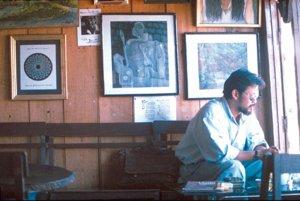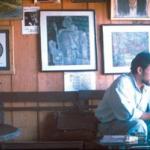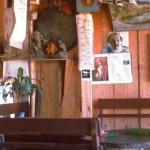A Poet's Corner in Dalat
The name is unfortunate. Inevitably, one thinks of a convenience store, or a gas station. But the Stop and Go Cafe in Dalat is a place for poets searching for the muse. And the muse definitely inhabits this cafe, as a journalist from Thailand has said.
The Stop and Go Cafe is a Bohemian kind of a place, a two-level, low-ceilinged and L-shaped room, tucked into a row of small shops across the street from the town's central block of kiosks and the movie theater. It is perched over a hill, its long glass window offers an exciting view of the town's market below, with the women selling sweet puddings, noodle soups, fruits, fresh vegetables and colorful bunches of flowers. At night, the lights below twinkle to reflect the magical character of this resort town. Every day that I am in Dalat, I would come to claim a window seat at the Stop and Go. I would sit by that window between lunch and dinner, observing a mother selecting a live chicken or a seller unloading a huge basket of carrots or strawberries. Time would slip away, and so would all my anxieties. I would get absorbed in the mundane activities of men in fur hats and trench coats as they haggle with those wishing for a ride on their Russian motorcycles or ancient three-wheeled taxis.
Dalat is where one goes to escape the crazy pace of Saigon and Hanoi, and the Stop and Go Cafe is where I find the needed tranquillity to assess all the things that I take in whenever I am on a trip to Vietnam.
Others too seem to settle into a calm and content mood in this cafe full of quirky paintings, low benches and tables made out of tree trunks. Many Westerners visit in the evening, spending long moments writing passages in their travel journals. Some of what they write will turn up as poems or thoughtful reflections on Vietnam, recorded in oversized notebooks stacked in a corner of the cafe, ready for anyone's perusal. I have seen entries in French, German, Japanese, and a host of other languages. Business cards of all types and photos accompany most of the entries. I have also seen touching notes written by Vietnamese from overseas, overwhelmed by the rediscovery of Dalat, and of home, for the first time in fifteen or twenty years.
A lot of the messages are tributes to the owner, Mr. Duy Viet, a soft-spoken man rarely without his beret, his scarf, an old corduroy jacket and sandals. A cigarette between his lips, a cup of tea in his other hand. And a greying goatee on his chin. Mr. Duy Viet is the exact image of a revolutionary thinker (a gentle one), a poet or a lit professor. In fact, he is all of those, and more. His eyes seem to have retained the fierceness that must have accompanied his days as a student leader in the early sixties. They also have the kindness of the teacher he later became. In the seventies, he was a journalist, and a congressman imprisoned for a while for opposing the ruling party. He keeps much of this to himself, and prefers to talk to his customers about his love of growing orchids, or about Vietnamese temples, kings and emperors. And poetry.
Mr. Duy Viet keeps a set of Japanese felt pens with which he will write out, in flourishing style, poems composed just for you -- in French, English or Vietnamese. He might even sing some of his songs for you, strumming a guitar that looks like it is the age of your grandfather.
Though he is a presence at the cafe, Mr. Duy Viet will usually keep quiet and leave you to your reflections. (His is the only cafe in Vietnam that doesn't have a boom box blaring out Vietnamese, Hong Kong or American pop tunes.) Once in a while, he will become animated with the arrival of a regular customer, usually a white-bearded old friend who comes to read and write poetry with him. They will bicker over words, or slap each other on the back when they come up with the right images for a difficult line. Sometimes, a Vietnamese monk with a Japanese Zen name will stop by, too. His smile, if not his haiku poems, will make you feel serene.
Mr. Duy Viet's wife runs a low-key souvenir shop by the entrance to the cafe, and the two often have lunch and dinner with their three children in the cafe. If you're there, chances are you'll be invited to join them. Mr. Duy Viet's assistant, a young woman who looks like she could be twelve, cooks fabulous fish dishes behind the glass counter. And if you're lucky, Mr. Duy Viet will serve some of the plum wine he makes himself. It's good but you should opt for tea and save the sweet wine for later. The family will serve an evening meal to a group of up to fifteen people for a small fee, with just a few hour's notice.
In the three years since Mr. Duy Viet opened the Stop and Go Cafe, it has been a gathering place for local poets, young and old, who squeeze onto the benches and test out their poems on each other in the early mornings. The place gets busy in the evening with Western tourists. I've met two Belgian bankers there, taking a break from their research into the doings of Vietnamese currency, and a French filmmaker accompanying a friend on his second visit, the first as a functionary in the colonial administration of the late forties. There was also an American psychologist-in-the-making, escaping the "jaded gay scene in New York," a Swiss biotech scientist, a Vietnamese photographer, and two Jewish English women "doing the roots thing" in Jerusalem. And those are the ones I remember. Mostly I remember rather enlightened travelers who have found a decent place to relax, think about Vietnam, and home, and to write a poem or a few postcards before the next part of their journey. If Saigon is where one comes to understand the forceful Vietnamese entrepreneurial spirit, Hanoi is the place to understand the Vietnamese resilience in the face of relentless hardship. In Hue, you will find the romantic struggling soul of Vietnam.
But Dalat is the place to understand the gentle and cheerful nature of the people. And the Stop and Go Cafe is where one finds the muse and the poets. Once you're there, refrain from associating its name with the gas station convenience stores of America. This is the place to slow down, to be without angst, and to turn contemplative. For many, Mr. Duy Viet's cafe is the place that inspires them to adopt a little of the Buddhist way of thinking. It is then that you remember that a temporal place in which one does nothing more than "Stop and Go" is sometimes referred to by a simpler name, Life.
 ThingsAsian
ThingsAsian


















